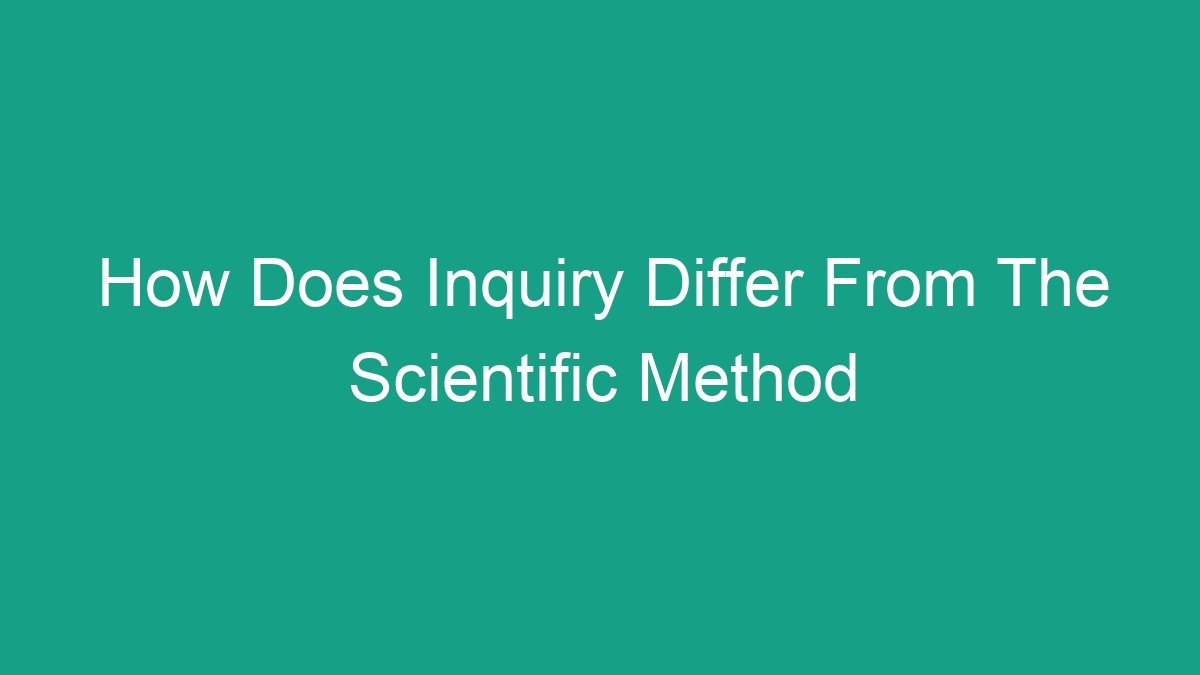
When it comes to the world of research and discovery, two common terms that often come up are “inquiry” and “scientific method.” While both are used to seek knowledge and find answers to questions, they are not the same. In this article, we will explore the key differences between inquiry and the scientific method, and how they each play a unique role in the pursuit of knowledge.
What is Inquiry?
Inquiry is the act of asking questions and seeking answers through observation, research, and investigation. It is a broad term that encompasses a wide range of methods and approaches to learning and discovery. Inquiry can take many forms, including asking open-ended questions, conducting interviews, collecting data, and making connections between different pieces of information.
At its core, inquiry is about curiosity and exploration. It is about being open-minded and willing to consider multiple perspectives and interpretations. In an educational context, inquiry-based learning emphasizes student-driven investigation and discovery, rather than passive absorption of information.
Understanding the Scientific Method
The scientific method, on the other hand, is a specific approach to inquiry that is used in the natural and social sciences. It is a systematic, step-by-step process for formulating and testing hypotheses, and for generating and evaluating evidence-based explanations for natural phenomena.
The scientific method typically involves several key steps, including:
- Observation: Noticing something interesting or unexplained in the natural world.
- Hypothesis: Formulating a testable explanation for the observed phenomenon.
- Prediction: Making specific predictions about what will happen if the hypothesis is true.
- Experimentation: Designing and conducting controlled experiments to test the hypothesis.
- Analysis: Collecting and analyzing data from the experiments to determine if the hypothesis is supported or refuted.
- Conclusion: Drawing conclusions based on the evidence and determining if the hypothesis should be accepted or rejected.
The scientific method is designed to be rigorous, objective, and replicable. It relies on empirical evidence and logical reasoning to build a body of knowledge that is constantly being revised and updated based on new discoveries.
Differences Between Inquiry and the Scientific Method
While both inquiry and the scientific method are grounded in the pursuit of knowledge, there are several key differences between the two:
- Scope: Inquiry is a broader concept that encompasses a wide range of methods and approaches to learning and discovery, including the scientific method. The scientific method, on the other hand, is a specific approach to inquiry that is used in the natural and social sciences.
- Systematic Approach: The scientific method is a systematic, step-by-step process that follows a specific set of procedures for formulating and testing hypotheses. Inquiry, on the other hand, does not necessarily follow a strict, linear process and can take many different forms.
- Empirical Evidence: The scientific method places a strong emphasis on using empirical evidence and controlled experiments to test hypotheses. While inquiry may also involve collecting and analyzing data, it is not always as focused on generating and evaluating evidence-based explanations for natural phenomena.
- Objectivity: The scientific method is designed to be objective, meaning that it aims to minimize bias and personal interpretation in the process of generating and evaluating evidence. Inquiry, however, may involve subjective interpretations and multiple perspectives.
Applying Both in Research and Learning
While the scientific method is a specific approach to inquiry, both concepts can be applied in research and learning in complementary ways. Inquiry can be used as a broad framework for exploring questions and seeking answers, while the scientific method provides a specific set of procedures for testing hypotheses and building evidence-based explanations for natural phenomena.
For example, in an educational setting, inquiry-based learning can provide students with the opportunity to ask questions, conduct research, and make connections between different pieces of information. Once students have formulated hypotheses and predictions, they can then apply the scientific method to design and conduct experiments, analyze data, and draw evidence-based conclusions.
FAQs
Q: How can I use inquiry and the scientific method in my own research?
A: If you are conducting research, start by asking open-ended questions and seeking answers through observation, research, and investigation. Formulate testable explanations for the phenomena you observe, and then use the scientific method to design and conduct experiments, analyze data, and draw evidence-based conclusions.
Q: What are the limitations of using the scientific method alone?
A: While the scientific method is a powerful tool for generating and evaluating evidence-based explanations, it is not always applicable to all areas of inquiry. Some phenomena may be difficult to study using controlled experiments, and some questions may be more effectively explored through other methods, such as historical analysis or qualitative research.
Q: Can the scientific method be applied outside of the natural and social sciences?
A: While the scientific method was originally developed for use in the natural sciences, its systematic, evidence-based approach has been adapted for use in other fields, such as economics, psychology, and policy analysis. In these fields, the scientific method is used to generate and evaluate evidence-based explanations for human behavior and social phenomena.



